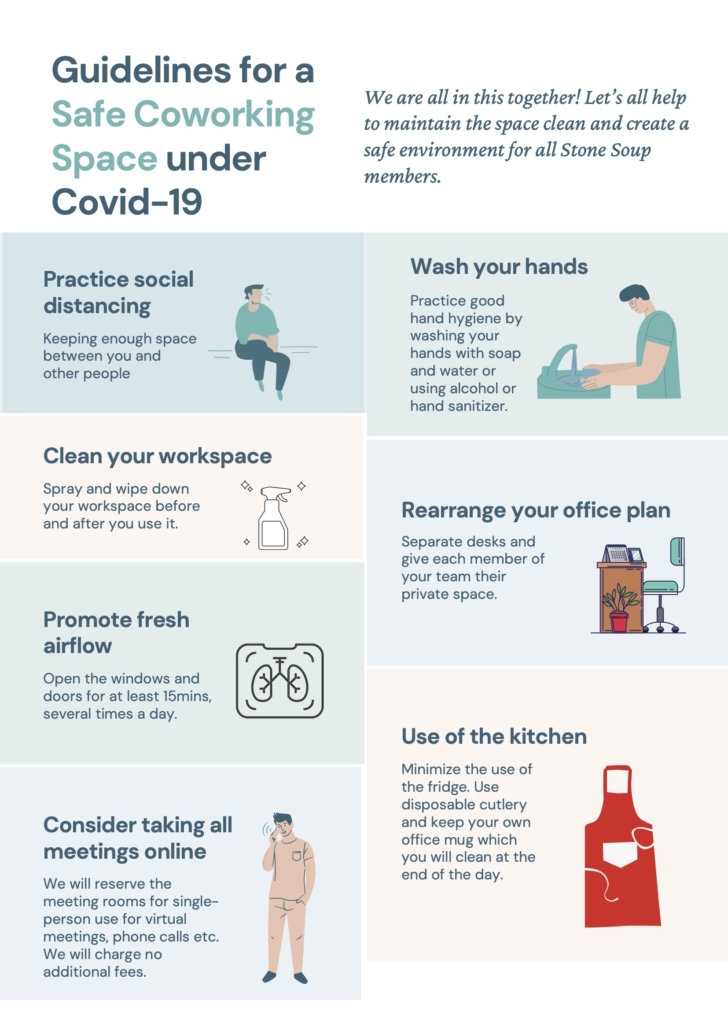Protective measures for a safe coworking space
Our coworking life and our safety at work were disrupted about a month ago. Since then we started working from home and avoiding social interactions to protect ourselves. Is it too soon to start thinking about the end of this social distancing experiment and imagine that our lives are going back to normal?
I guess one thing we all realised is that physical distancing really sucks! And that we take our social life for granted.
End of April we will start operating again and we want to make sure that our coworking space will be safe for all of you. We plan to be at the space 2-3 days a week for a few hours to manage member requests, play music and brew some coffee for you!
Coworking with safety at Stone Soup
We are in a fortunate situation compared to other busier coworking spaces and office environments. The number of people who use our space at any given time is usually quite low compared to the size of our workspace. That makes it possible to implement social distancing within our work environment.
However, for extra safety, we will not allow member drop-ins. We will also rearrange some of Stone Soup spaces to enable distancing ourselves (meeting rooms, kitchen) and we have installed additional disinfectants for members to use.
Some new rules will apply to make our workspace a safe environment to work at. Can we change alone or do we need the help of our members?
We are all in this together: let’s maintain the space clean

Help us keep our community safe and protected by implementing physical distancing measures and enhanced hygiene practices! We would also like to draw your attention to areas of high traffic, where lots of people engage with the same items and surfaces. Let’s be aware and protect ourselves from those areas!
- Door handles: They are one of the most touched spots in the office. Use some tissue, your elbows or your hand within a sleeve to open the door. Before getting back to work, use anti-bacterial gel – especially if you’re about to eat.
- Desks: Use one desk and don’t swipe seats in the coworking space. Please don’t share desk equipment and clean your phone, pens and your bag at least once per day.
- Toilets: Always wash your hands after using the toilet and try not to touch the faucet or door handle on your way out.
- Meeting rooms: We will reserve the meeting rooms for single-person use for virtual meetings, phone calls etc. We will charge no additional fees.
We will focus on providing a safe environment for our members and we hope that we will see you all coming back in the next weeks! If for some reason you think that continuing working from home suits you best don’t worry! Our COVID-19 mission is alive: to ensure that all our members can remain connected to their community, no matter the distance. We will continue the Virtual Coworking and you will still be able to interact with our members!
Safety rules for the protection of our coworking space
Here is a list summing up all our protective measures for how to maintain the coworking space safe and clean.
- Keeping enough space between you and other people
If you can reach out and touch someone from your workstation, then your office isn’t set up for physical distancing.
- Spray and wipe down your workspace before and after you use it.
Please use one desk and don’t swipe seats in the coworking space. Don’t share desk equipment and clean your phone, pens and your bag at least once per day.
- Promote fresh airflow throughout the office
Open the windows and doors for at least 15mins, several times a day.
- Consider taking all meetings online.
We will reserve the meeting rooms for single-person use for virtual meetings, phone calls etc. We will charge no additional fees.
- Rearrange your private office plan.
Separate desks and give each member of your team their private space.
- As you work, make sure you regularly wash your hands.
Door handles are one of the most touched spots in the office. Use some tissue, your elbows or your hand within a sleeve to open the door. Before getting back to work, use anti-bacterial gel – especially if you’re about to eat.
- Limited use of the kitchen.
Minimize the use of the fridge. Use disposable cutlery and keep your own office mug which you will clean at the end of the day.


